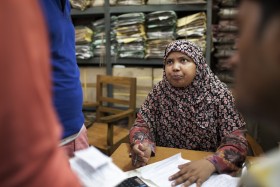
The Daily Star in Bangladesh printed an OpEd by Namati’s friend Bremen Donovan to coincide with a conference on Statelessness attended by Namati and its partner the Council of Minorities.
It is one of the first times the wider Bengali public have been exposed to the work of paralegals from the Urdu-speaking community.
The OpED is available in full at this link and below:
By Bremen Donovan
THIS week in The Netherlands, Bangladesh’s little-known Urdu-speaking minority – often referred to inaccurately as ‘Biharis’ – will be centre stage at the world’s first ever Global Forum on Statelessness.
The conference, hosted by Tilburg University and the United Nations High Commissioner on Refugees (UNHCR), will hear how an innovative new program in Bangladesh is helping to turn the tide on years of discrimination and impoverishment.
The rest of the world has largely forgotten the existence of the Urdu-speaking minority in Bangladesh – and the plight of the 300,000 who remain in the 116 supposedly temporary camps set up during the Liberation War.
Whether they be so-called ‘building camps’ converted from abandoned Government offices, or just makeshift shanties, the camps where half the country’s Urdu-speakers live are disintegrating and hugely overcrowded. In many of the building camps the floor may simply crumble under your feet. Gaps in the walls expose rusted steel and rotting concrete. Electrical lines hang in webs above the hallways. The overcrowding means most families – sometimes up to 10 people – share a single 2.5m-square room.
Despite a High Court ruling in 2008 that guarantees citizenship for Urdu-speakers, the people in the camps continue to face serious obstacles to obtaining documents like passports and birth certificates – without which breaking out of poverty is almost impossible. They often face demands for bribes, and refusals by government officers. What sets them apart from other Bangladeshis is the Urdu-inflected Bangla they speak, and for those from the camps, their address.
Farzana Naz lives in Staff Quarter Camp in Dhaka and is typical of many of her generation: she has never known anywhere other than Bangladesh as her country and she needs identity documents to improve her life. Farzana has applied for a passport so she can take a job as a domestic worker in Saudi Arabia to support her daughters through the rest of their schooling. A young woman called Nahid Parvin is helping with her case.
Nahid is a paralegal, or grassroots advocate, trained to support members of her community through the process of applying for legal identity papers and to document where there are hold-ups. She is at the forefront of a practical, law-based movement to ensure that the government makes good on its promise of 2008 – that Urdu-speakers are, by law, Bangladeshi citizens.
Nahid Parvin works for an organization called The Council of Minorities (CoM), which has partnered with the international legal empowerment organization Namati to provide support to people seeking citizenship documents. Namati also does similar work with the disenfranchised Nubian people in Kenya. “This is an awesome project,” says Khalid Hussain, founder & Chief Executive of CoM. Khalid grew up in Geneva Camp and was the first person from the camp to become certified as a lawyer.
As of June 2013, there are ten paralegals and three volunteers working across camps in five cities across Bangladesh. In little more than a year they have assisted more than 1350 clients.
Paralegals like Nahid are aware of the fears of many camp residents and the discrimination they can face and are trained to step in to provide crucial support. Paralegals are taught in the basics of the law, and the procedures for obtaining citizenship documents, and they are comfortable dealing with authorities and advocating on behalf of their clients.
One issue is awareness – not all Urdu speakers know they are even entitled to citizenship documents or that these documents are essential if they want to educate their children or access other basic services. Many fear trying to navigate the bureaucracy. Paralegals like Nahid are working to spread the word.
By doggedly pursuing formal, legal channels, and winning cases little by little, the Council of Minorities and Namati are chipping away at an entrenched system of brokers, middlemen and corrupt bureaucrats that stand in the way of Bangladeshi citizens obtaining basic citizenship documents. This is the work that will be highlighted at the Global Forum on Statelessness in The Hague on September 15-17.
“This project is important because you’re establishing citizenship rights,” says Khalid. Passing the law is one thing. Making sure what’s written trickles down to the individual is the real challenge.
Many of the people living in the camps, Khalid’s generation, were not even born at the formation of Bangladesh. They are interested in belonging to the only country they have ever known. Nahid says discrimination ran deep in school, too. Teachers would say to her, “Oh, you’re from the camps, you killed our forefathers in ’71.” “I didn’t say anything,” she says. “But I cried all the time.”
“Urdu is not an enemy language,” says Khalid. “Our language is Urdu but we are Bangladeshi.” He is right. The law says so.
The writer is a US-based writer and photographer.